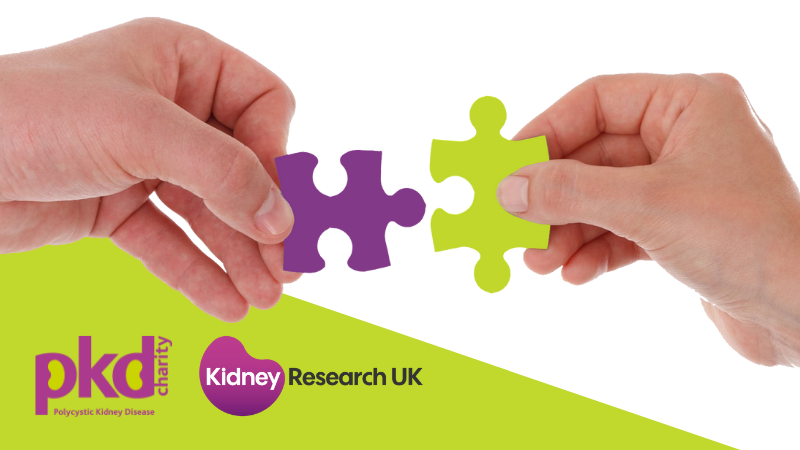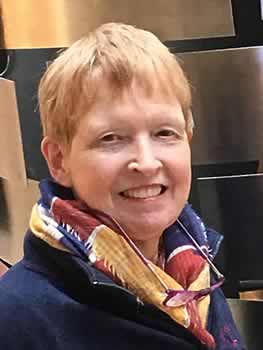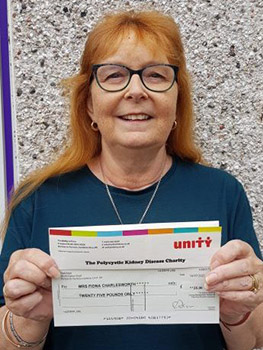
PKD patients set to benefit from research investment of over £500,000
PKD Charity and Kidney Research UK have teamed up to fund three research projects to improve the lives of PKD patients, with grants worth a total of £537,000.
The awards mark the start of a new collaborative approach to funding by our charities, in order that research benefits patients faster.
Teams led by Professor Colin Johnson at the University of Leeds and Professor Albert Ong at the University of Sheffield will investigate treatments that can slow or prevent the progression of ADPKD while also identifying the benefits of early treatments and how doctors can identify future patients. A PhD Studentship was awarded to Dr Joe Cockburn at the University of Leeds which will investigate early treatments for ARPKD.
PKD affects nearly 70,000 people in the UK alone. Faulty genes cause fluid-filled cysts to develop and grow in the kidneys. This can happen at any point during pregnancy, childhood or adulthood. The cysts multiply and increase in size, causing the kidneys to enlarge from the size of a fist to a rugby ball or bigger. There are two main types of PKD: autosomal dominant polycystic kidney disease (ADPKD) and autosomal recessive polycystic kidney disease (ARPKD).
The projects have huge potential:
- Colin and the team at Leeds University have screened drugs that are already approved for use in other conditions and identified two candidates for use in ADPKD. They are going to grow primitive kidneys in his lab to test two new existing new drugs. His approach could find new drugs for this disease much faster and cheaper than more conventional drug discovery techniques.
- Through a detailed study into the mechanisms of two different gene variants that can cause ADPKD, Albert and the team at Sheffield University will be able to define new molecular targets that are common to how all cysts form and test new drugs that could stop cysts from forming in the first place.
- ARPKD is almost always caused by faults in a gene called PKHD1 which produces the protein fibrocystin. At Leeds, Joe is going to employ a PhD student to look through 650 faults in PKHD1 and the effect that these have on the protein fibrocystin. This should lead to better understanding of the impact of different gene faults on the function of fibrocystin. This information could help develop new treatments for ARPKD and would lead to much more tailored decision-making since clinicians would be able to predict with much more accuracy how a child’s ARPKD might develop.
Dr Aisling McMahon executive director of research, innovation and policy at Kidney Research UK said:
“While the condition itself is rare in comparison to the kidney population as a whole, PKD is the most common cause of inherited kidney disease and continues to have a devastating impact on those who have to live with it and their families. Our researchers have the potential to make a huge difference to the lives of everyone living with PKD. If our funding enables both teams to identify and develop new treatments which improve lives, this will be an achievement that the scientific community can be proud of.”
There is currently no cure for PKD, just treatments designed to delay the progression towards kidney failure. Once kidney failure has occurred, patients will require gruelling dialysis treatment and/or have to wait for a kidney transplant.
New innovations that could prevent or delay the progression towards the need for these treatments would significantly improve the lives of PKD patients.

Tess Harris
The projects are a culmination of a two year programme to identify the top research priorities for ADPKD, funded by PKD Charity. The Priority Setting Partnership (PSP), coordinated by the James Lind Alliance (who specialise in PSPs) asked people affected by ADPKD (either directly or due to ADPKD in their family) and healthcare professionals to choose and rank their most important research needs via a series of surveys and workshops. The Leeds and Sheffield research projects meet the top 1 and 2 research priorities. Read the PSP report here.
Tess Harris, CEO of The PKD Charity, said:
“We are delighted to jointly fund these exciting new projects led by world-renowned PKD experts at the universities of Leeds and Sheffield. New treatments are urgently needed to slow down or prevent the relentless progression towards kidney failure in PKD. Projects like these give hope to the thousands of individuals and generations of families in the UK affected by PKD.
"The teams will carry out their research over the next three years with the two academic institutions working closely together to share their findings and maximise potential positive outcomes."

Fiona Charlesworth
PKD patient, Fiona Charlesworth said:
“PKD is a disease that has taken its toll on me and my family members and it’s high time that more is done to treat it. Having to go through unbearable pain, the gruelling process of dialysis and the fear that a transplant might not work was not only a physical struggle but a huge mental and emotional challenge. £0.5m of funding is such a positive step that I hope will be put towards finding new treatments and methods to prevent rejection after transplantation.”
- Hits: 23533
